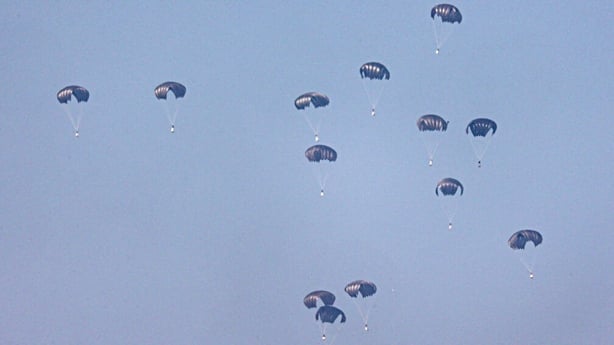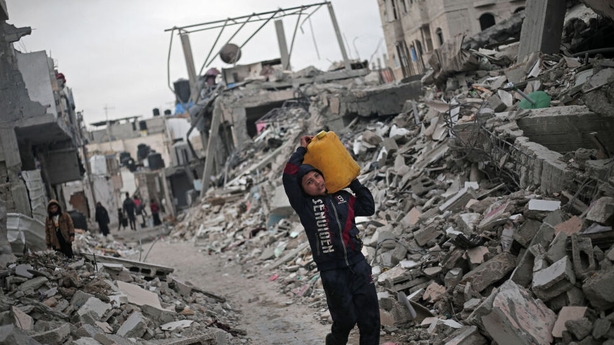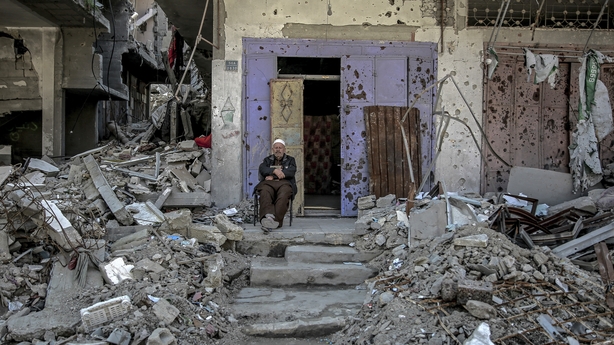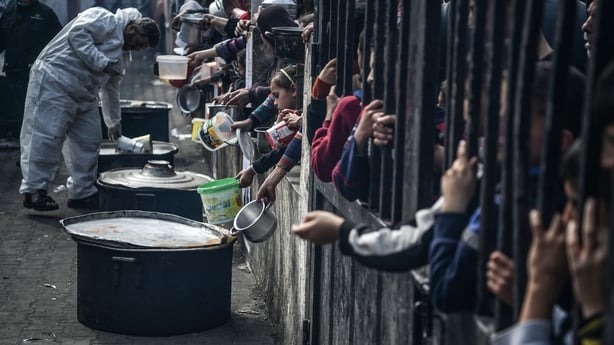Egypt has warned that Israel's planned ground invasion of Rafah in southern Gaza would have "catastrophic repercussions" for peace in the Middle East.
Foreign ministers from Arab League countries told the United Nations Human Rights Council that some nations were turning a blind eye to the suffering in Gaza.
Egyptian Foreign Minister Sameh Shoukry said the extreme polarisation exposed by the Gaza war had laid bare the double standards of some members of the UN's top rights body.
Israel has said a truce with Hamas would delay, not prevent, a ground invasion of Rafah on the Egyptian border, where an estimated 1.4 million Palestinian civilians have sought refuge from the war.
"The world is witnessing the most heinous crimes and violations against the Palestinian people," Mr Shoukry said.
He called for an immediate ceasefire and urged Israel not to attack Rafah.
"Any military action in the present circumstances would have catastrophic repercussions that undermine peace in the region," he warned.
The war in Gaza began after the Hamas militant group that controls the Palestinian territory launched an attack on 7 October that killed about 1,160 people in Israel, mostly civilians, according to an AFP tally of Israeli figures.
Hamas militants also took hostages, 130 of whom remain in Gaza.
Israel's retaliatory bombardment and ground offensive in Gaza have killed at least 29,878 people, most of them women and children, according to the territory's Hamas-run health ministry.
Mr Shoukry said some countries on the 47-member Human Rights Council in Geneva were shying away from the firm action they had taken over other conflicts.
"It seems that life in Gaza is not worthy enough of their attention, that the massacre of tens of thousands of children fails to shake their otherwise all-too-sensitive conscience," he said.
"The lives of Gaza's children are seemingly less valuable than others.
"This preludes the... collapse of the international system, including this council."
Jordan's King Abdullah today arrived at a military air base to oversee the departure of seven C-130 military transport aircraft, three from Jordan and the rest from Egypt, Qatar, France and the UAE, to air drop food parcels along the Gaza coast for a second day.
A diplomat, who was not authorised to speak publicly, said the monarch was on board one of the Jordanian planes in the second such mission he personally joined this month.
There was no immediate comment from the king's palace.
The waterproof parcels of ready-made meals were parachuted over several locations along the coast where hundreds of desperate people rushed to collect them.
Kuwaiti Foreign Minister Abdullah al-Yahya said the "brutal crimes of the Israeli occupation forces against defenceless civilians" had led to "catastrophic crisis and destruction".

Moroccan Foreign Minister Nasser Bourita said the world "cannot keep turning a blind eye" to the "unprecedented human disaster" in Gaza.
Qatari International Cooperation Minister Lolwah Al-Khater said Gaza was witnessing a "genocidal war", while the situation in the Israeli-occupied West Bank was also deteriorating.
"Sponsoring this Israeli exceptionalism above international law by some global powers should stop," she told the council.
Meanwhile, Tunisian Foreign Minister Nabil Ammar, speaking via video-link, said human rights were being violated in Gaza "with the utmost barbarism" and said the international community had been "paralysed because of a handful of countries".
Israel 'systematically' blocking Gaza aid access - UN
Earlier, the UN said that Israeli forces are "systematically" blocking access to people in need of aid in Gaza, complicating the task of delivering aid in what has become a lawless war zone.
It has become nearly impossible to carry out medical evacuations and aid deliveries in northern Gaza and increasingly difficult in the south, said Jens Laerke, spokesman for the United Nations humanitarian agency OCHA.
All planned aid convoys into the north have been denied by Israeli authorities in recent weeks, with the last allowed in on 23 January, according to the World Health Organization.
Making matters worse, even convoys cleared in advance with Israeli authorities have repeatedly been blocked or come under fire.
Mr Laerke pointed to an incident last Sunday when a convoy, jointly organised by the WHO and the Palestinian Red Crescent (PCRS), to evacuate patients from the besieged Al Amal hospital in the southern city of Khan Yunis, was blocked for hours and paramedics detained.
"Despite prior coordination for all staff members and vehicles with the Israeli side, the Israeli forces blocked the WHO-led convoy for many hours the moment it left the hospital," Mr Laerke told journalists in Geneva.
"The Israeli military forced patients and staff out of ambulances and stripped all paramedics of their clothes," he said, adding that the convoy, which was carrying 24 patients, remained blocked for seven hours.

"Three PRCS paramedics were subsequently detained, although their personal details had been shared with the Israeli forces in advance," Laerke said, adding that just one had been released so far.
"This is not an isolated incident," he stressed.
"Aid convoys have come under fire and are systematically denied access to people in need."
Such "inadequate facilitation for the delivery of aid throughout Gaza means that humanitarian workers are subject to unacceptable and preventable risk of being detained, injured or worse", Mr Laerke said.
The Hamas attack that triggered the war resulted in the deaths of around 1,160 people in Israel, mostly civilians, according to an AFP tally based on official figures.
Militants also took about 250 Israeli and foreign hostages, 130 of whom remain in Gaza including 31 presumed dead, according to Israel.
Israel's military campaign has killed at least 29,878 people in Gaza, mostly women and children, according to the territory's health ministry.
Biden hopeful for temporary ceasefire in Gaza 'next week'
Meanwhile, US President Joe Biden has said Israel had agreed to halt its Gaza attacks for the Muslim holy month of Ramadan, adding that he hoped a temporary ceasefire would take hold next week as Hamas reviewed a truce deal that includes a prisoner-hostage swap.
Mr Biden's remarks, which were recorded yesterday and were due to be broadcast later today, come as negotiators try and hammer out a truce deal in the conflict.
A senior source close to the talks told Reuters that the Islamist group, which Israel has vowed to annihilate, was studying a draft proposal that includes allowing in a significant amount of humanitarian aid, as well as swapping Palestinian prisoners in exchange for hostages captured in the Hamas attack on 7 October.
The proposal is the most serious attempt in weeks to halt the fighting, and comes ahead of the Muslim fasting month of Ramadan and with international pressure mounting on Israel to stop the killing of Palestinian civilians.
Ramadan this year is expected to begin on the evening of 10 March.
"Ramadan is coming up, and there's been an agreement by the Israelis that they would not engage in activities during Ramadan, as well, in order to give us time to get all the hostages out," Mr Biden said during an appearance on NBC's Late Night with Seth Meyers.

US and Israeli officials discussed a ceasefire proposal last week with Qatari and Egyptian mediators at a meeting in Paris.
Delegations from Hamas and Israel are both in Qatar this week for so-called proximity talks, held in the same city through mediators.
Qatar cannot comment on remarks by Mr Biden that a ceasefire could be agreed next week, a foreign ministry spokesperson said.
Majed Al-Ansari told a press conference there was no breakthrough to announce on a ceasefire and hostage deal, but that Qatar was "pushing hard" for the agreement sketched out in Paris to be accepted by Israel and Hamas, which runs Gaza.
He said Qatar was "upbeat and optimistic on Gaza mediation talks".
Mr Biden, who is running for re-election, told NBC there was an agreement in principle for a ceasefire between the two sides while hostages were released, adding that he hoped to have a ceasefire in the conflict by the following Monday.
"There are too many innocent people that are being killed. And Israel has slowed down the attacks in Rafah," Mr Biden said, adding that Israel had committed to make it possible for Palestinians to evacuate from Rafah in Gaza's south before intensifying its campaign there to destroy Hamas.

'Children bearing the heaviest price'
Speaking on RTÉ's Morning Ireland, UNICEF Middle East Communication Officer Salim Oweis said the threat to children in particular in Gaza is not just from bombs, but now they face acute malnutrition.
"For over four months now, we're seeing a real dangerous rise in malnutrition among children under two," he said.
"Before this escalation in Gaza as a whole, there was only .8% of the population under two facing acute malnutrition. Now in the north of Gaza, it's 15.6%.
"Another part of the story is the spread of diseases, the lack of water, the lack of fuel. We are in winter in this region, the weather is really harsh on children and their families, especially those who are sheltering in tents and makeshift shelters.
"We need an immediate continued ceasefire for children and their families to be able to live and for the aid to continue."

